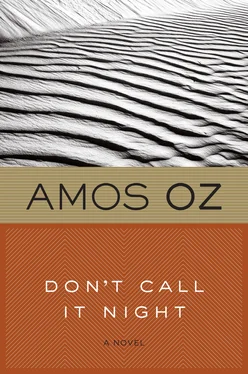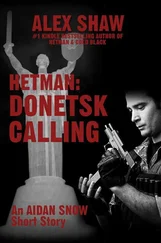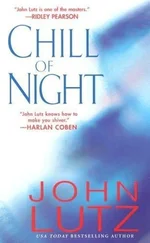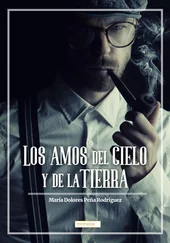So it came about that at the age of thirty-two she left the house that had been her home, packing all her belongings in three suitcases, and sending the collection of picture postcards as a gift to the Mahatma Gandhi Sanatorium, and went to study literature at Tel Aviv University surrounded by students who were ten years younger. After that she became a secondary school teacher in Bat Yam, lived once or twice with older men, had an abortion with complications and finally, for six months, lived with a famous professor, originally from Prague, who in his retirement was devoting himself to preparing a revised edition of an Essence of Judaism in six large volumes. This professor was a sour, sarcastic man, and his hobby, from his youth on, had been piano-tuning. Whatever the time, whatever the weather, he was always ready to set off for anywhere, with his little bag of instruments under his arm. He was not a young man, nor a well man, and he would tune a piano for nothing. So long as it was a real, pre-war piano. One day the professor accepted an invitation to spend the remaining years of his retirement in the guesthouse of the Catholic University of Strasbourg, where he hoped to discover afresh, peacefully, the essence of Judaism. Noa felt she, too, ought to leave the country for a year or two, to find out whether some other kind of life were possible. Friends arranged a part-time job for her in Venezuela. It was there, in Caracas, thanks to some concert tickets, that we met. Since then we have been tied to each other.
AFTER the nine o'clock news and the weather forecast, Theo said, Let's switch off and go out for a bit. I changed out of the dress I wore around the house and put on jeans, a red top and white walkers. Theo was wearing walkers too, and jeans with a broad belt. Going down in the elevator we hugged and I buried my face in his shoulder. His body was warmer than mine and the belt gave off a smell of old leather and sweat. I said: You're always so warm.
Theo said: You're on holiday as from yesterday. What are you going to do, Noa?
I said: The clinic. Immanuel House. Only I wish we hadn't had to take your money. That wasn't good. I mean, I don't feel good about it. Avraham's going to repay it all next week.
Theo said: Avraham: who's that?
And a moment later: Oh yes. Your African. It's not urgent.
There was no one in the street. A row of parked cars and a row of streetlights, some of them not working. Some pathetic trees, Indian beech, eucalyptus, tipuana, grew as though they had difficulty breathing. The trees, in fact the whole street, suddenly looked to me like an amateur stage set. The windows of the apartments were open and from almost every one came the voice of Housing Minister Sharon shouting at his interviewers. A dry breeze blew from the hills to the east. A startled cat suddenly slunk out from the trash cans and almost tripped us. I put my arm round his waist and laid it on the broad belt, which was rough to the touch. The metal buckle gave my fingers a cold thrill. Shabby staircases showed in the entrances to the buildings in a murky light that seemed to infect the mailboxes, too.
Theo said: The Mayor. Batsheva. The dinosaur. You ought to try and speak to her, not in her office, privately, about your fantasy. I don't suppose you'd let me speak to her? Would you?
This business will go better without you.
And without you, Noa.
Don't take everything away from me.
Everything. What's everything? There's nothing there.
On the corner of the street, at a point the streetlight could not reach, a couple stood in a motionless embrace, like a sculpture, with lips joined, frozen in a kiss that in the darkness resembled mouth-to-mouth resuscitation. As we walked past it seemed as though the border between them had been erased. I fancied the girl was one of my Talis from class 12, and hoped I was mistaken, though I didn't know why. So I couldn't prevent myself from staring like someone at an identity line-up. For some reason I was blushing in the dark.
From a first-floor window came a sound of regular, even crying, the crying of a satisfied baby who would grow into a calm child. Theo hugged my shoulders and for a moment I had a feeling his squinting left eye was scheming something in the dark. Two streets further on the town suddenly stopped like a ship whose bows were stuck in the sand on the shore. And the desert began. Theo leading, we went down the path that led into the wadi. His shadow covered me and my shadow, because I was walking so close. Black flints cast dark conical forms behind them that seemed to be cut with a knife because of the silvery sharpness of the moonlight. Scattered bones whitened here and there among the stones. From down below in the wadi came a gust smelling of dried thorns. It was as though the pale rocks, the slope, the hills to the east, even the sharp starlight, were all waiting for a change. Which would come at once, in another moment, and then everything would be clear. But what the imminent change was or what needed to be clarified I had no idea.
Theo said: It's night here, too.
I fancied I heard a slight hesitancy in his deep, calm voice, as though he were unsure of his ability to convince me that it was night here, too, as if he doubted whether I could understand.
Once this summer's over, I said, we'll see what comes next.
Theo said: What comes next?
I don't know. Let's wait and see.
At a bend in the wadi a shadow stained the road: a fallen rock. No, not a rock. A wreck. An abandoned car.
It wasn't abandoned. It was a Jeep. Silent. Lights out. From close up we could see the shadow of someone, a head drooping onto the steering wheel. A man by himself, bent, huddled, his coat collar turned up, uttering smothered laughs at irregular intervals. Theo put his hand in front of me to halt me. In three strides he had reached the Jeep and bent over the huddled man. He may have asked if he could help. The man raised his head and stared, not at Theo but at me, motionless, then slowly sank back onto the steering wheel. Theo stayed for a moment, his dark back hiding from me whatever it was he was asking or doing, then he took my hand and pulled us further on towards the lonely poinciana. What was the matter, I asked, but Theo didn't answer. Only when we'd passed the poinciana, as though he'd invested a lot of thought in his reply, he said:
It was nothing. He was crying.
Shouldn't we have stayed a bit? Or else—
It's not a crime to cry.
We had reached the top of the hill known as Hyena Hill. Yellow, sparse, scattered in the darkness, the lights of the town flickered as if they were vainly trying to answer the stars in their own language. On the southern horizon a blinding light flared up then died in a dull explosion. Look, I said, fireworks. Soon there'll be music too. Theo said:
A flare. It wasn't a firework, Noa, it was a flare. From a plane. Their night training. They're firing at dummy targets.
And suddenly, perhaps because of the words "dummy targets", I remembered with a pang the poet Ezra Zussman, and the bereaved father, Avraham, their shy smile shining and dying away in an instant, fine, melancholy smile, like autumn clouds parting. The boy's downcast eyes behind the long lashes, and the father's face furrowed with lines of subdued affection, like a weary retired metalworker. What did he have left now? In Lagos? Waiting for the return of the chimpanzee he abandoned in a clearing in the forest? What was keeping him there, and what did he want from me, really, deep down inside? By means of what spell was that humble man managing to transmit his dim wish to me through the silvery summer night stretching between Tel Kedar and Lagos across deserts and plains, over thousands of moonswept mountains and peaks and valleys and expanses of shifting sands from here to there?
Читать дальше












